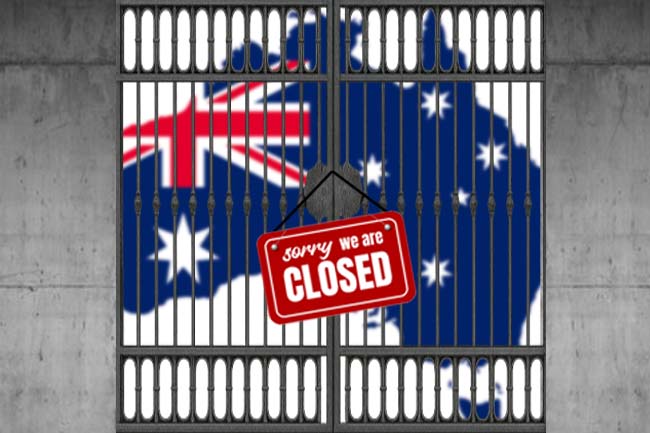The Coalition has continued its immigration misinformation campaign with lies regarding Labor and Liberal's deportation records, Dr Abul Rizvi writes.
IN AN INTERVIEW with Sky News’ chief news anchor, Keiran Gilbert, Shadow Home Affairs Minister James Paterson patently misled the audience when he said:
"Prior to this Government, it was standard practice — if you're a non-citizen and you committed a serious crime, no matter how long you've lived in this country, you are deported."
Paterson may be a young man and his memory may not go back more than a few years, but that wasn’t even the policy under the previous Coalition Government until about July 2019.
The chart included below highlights an abrupt change in policy on the cancellation of visas of people who were in prison or had spent time in prison, had their visas cancelled and were taken into detention pending removal.
That started in July 2019 when the number of character cancellations in detention jumped in one month from 353 in June 2019 to 569 in July 2019.
A jump like that does not happen by accident — it requires a policy change.

In 2019-20, the total number of people who had their visas cancelled under the Migration Act 1958 s501 Character provisions increased to 1,015 — compared to 937 in 2018-19.
The effect of that change in policy can also be seen in the revocation statistics. People who have had their visa cancelled under s501 of the Migration Act can request the cancellation be revoked.
That is often on the grounds that people have spent their formative years in Australia and/or that the cancellation would cause undue harm to a person’s family.
In 2018-19, there were 332 cancellations that were not revoked following a request for revocation. That abruptly increased to 450 in 2019-20, 438 in 2020-21 and 434 in 2021-22.
The portion of cancellations that were revoked upon request fell sharply from 41 per cent in 2018-19 to eight per cent in 2021-22.
Contrary to Paterson’s assertion, the policy quite clearly changed from July 2019.

It is relevant that there were 235 revocations of character cancellations in 2018-19 and 252 revocations in 2019-20.
In other words, Dutton was allowing the cancellation of visas of serious criminals to be revoked whereas he now pretends this did not happen when he was Minister.
Even under the harsher policy, decision-makers still took into account compassionate and compelling circumstances and revoked some cancellations.
That was the case right up until the last year of the Coalition Government when the harsher policy was applied most enthusiastically. It was never the blanket policy that Paterson alleges.
A good example of a character cancellation that was handled very differently under Home Affairs Minister Peter Dutton – even after the harsher policy was in effect – was that of Seyed Younes Tahami, who was recently involved in the horrific bashing of an elderly Perth lady.
In July 2018, Tahami was convicted to 18 months imprisonment for drug-related offences with a non-parole period of 13 months. He was also convicted of breaching his bail conditions.
In February 2019, his visa was mandatorily cancelled under the s501Character provisions. In June 2019, he was transferred from prison to immigration detention. In January 2020, a delegate of the minister revoked Tahami’s visa cancellation and re-instated his protection visa, enabling his release.
Another example of a Coalition government being flexible in such cases is that of Robert Jovicic, who came to Australia with his Serbian parents when he was two years old after being born in France.
Despite having never lived in Serbia and having spent over 30 years living in Australia, Jovicic was deported to Serbia after committing a series of drug-related burglaries.
Serbia did not accept that Jovicic was a Serbian citizen, leaving him stateless with no access to work or welfare. He didn’t speak a word of Serbian and didn’t know a single person in Serbia.
There was a media outcry after he started spending nights on the steps of the Australian Embassy in Belgrade, desperate for food and shelter.
The media pressure on Immigration Minister Amanda Vanstone became too great and she granted him a visa to return to Australia.
She stated:
"Australians don't want someone who's lived a long period of time here and got connections here to end up destitute overseas."
Apparently, Paterson and Dutton would not agree with Vanstone.
Morrison’s empty boast
Scott Morrison boasted about his Government’s harsher visa cancellation policy in Parliament when he talked about the number of people his Government had "punted" from Australia.
The reality was that the number of people "punted" from Australia had not actually increased so much as there was a sharp increase in both the number of character cancellations in detention and in the average length of time people were in detention.
While the Coalition increased the number of character cancellations in detention, removals and deportations from detention actually fell from 7,102 in 2017-18 to 5,550 in 2018-19, 3,284 in 2019-20, and 1,034 in 2020-21.
In other words, the Coalition was just building up a growing problem in immigration detention.
Deporting people who have spent their formative years in Australia is never easy because the receiving country will rarely be cooperative in accepting these people back. There are almost always a number of legal and other complications, even with close neighbours such as New Zealand.
The harsher policy created massive friction in Australia’s relationship with New Zealand because the biggest number of people affected were New Zealand citizens.
The subsequent decline in the number of character cancellations in detention under the Labor Government will have been the result of negotiations with the New Zealand Government.
Paterson is right that the new Ministerial Direction 99 will have been developed in response to those negotiations.
The wording of this Direction aligns very closely with the long-standing policy on the deportation of people who have spent their formative years living in Australia — not with what Paterson dreams the long-standing policy was.
Decision-makers have always been required to consider the strength and length of the person’s links to Australia.
The Coalition has announced that it will rescind Ministerial Direction 99 if in government, while the Labor Government has said it will amend it. But would that be good policy?
Ministerial Direction 99 states that:
In making a decision under section 501(1), 501(2) or 501CA(4), the following are primary considerations:
- protection of the Australian community from criminal or other serious conduct;
- whether the conduct engaged in constituted family violence;
- the strength, nature and duration of ties to Australia;
- the best interests of minor children in Australia; and
- expectations of the Australian community.
These considerations are entirely consistent with the policy prior to July 2019. While it may be that the Administrative Appeals Tribunal (AAT) has, in some instances, given too much weight to some of the above factors over others, the factors themselves are unobjectionable.
It is easy to make commitments to abolish one or more of the above factors while a politician is in opposition. Paterson’s grandstanding will play well in the media and already has the Labor Government on the run.
That will be until the reality of administering Paterson’s proposed blanket policy comes home to roost.
Not only will Paterson’s policy annoy many nations from whom Australia seeks cooperation on many matters, but the cost of lengthy detentions with often very poor prospects for removal will inevitably run foul of the High Court’s decision on indefinite detention.
It’s easy to show the High Court the middle finger when you are in Opposition, as Dutton and Paterson have been doing. But doing so in government has consequences.
If Paterson wants to be a future Home Affairs Minister, thinking more deeply about these issues would not go astray.
Dr Abul Rizvi is an Independent Australia columnist and a former Deputy Secretary of the Department of Immigration. You can follow Abul on Twitter @RizviAbul.
Related Articles
- While offshore student visa applications fall, onshore applications boom
- Capping student visas to curb net migration could create chaos
- More evidence Government’s net migration forecast for 2023-24 is too low
- Deportation Bill over-reach in addressing HC Decision
- Albanese Government is complicit in the cruel deportation of Australians
 This work is licensed under a Creative Commons Attribution-NonCommercial-NoDerivs 3.0 Australia License
This work is licensed under a Creative Commons Attribution-NonCommercial-NoDerivs 3.0 Australia License
Support independent journalism Subscribe to IA.















